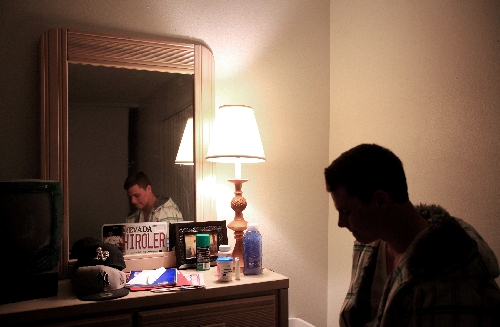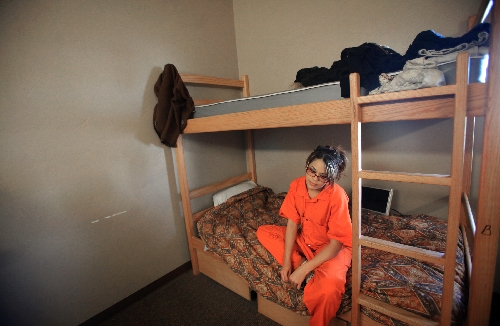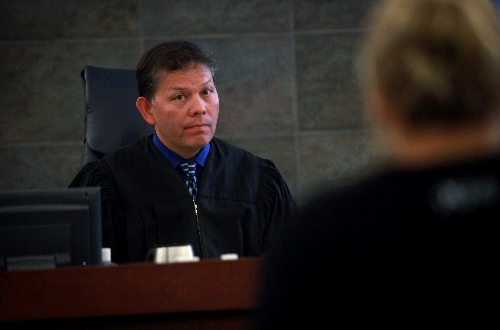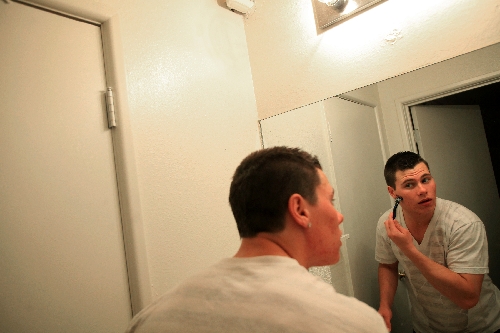Defendants seeking more chances crowd Youth Offender Court
Editor's Note: Part of an occasional series looking at the Youth Offender Court in Las Vegas.
It's standing room only in Judge Cedric Kerns' courtroom these days.
The 30 or so Youth Offender Court defendants and their families squeeze into the sixth-floor room at the Regional Justice Center in hopes that Kerns can wean them off drugs once and for all.
Broken down sons and daughters struggle to come to terms with their drug use. Eager parents try desperately to understand what they could have done differently and what can still be done to save the lives of their children, if anything.
Most of the defendants, ages 18 to 25, have been given third and fourth chances in the program, which has only been around since April.
That's the way it is when you try to tell an addict, "No."
Program funding comes from state grants slated for specialty courts, an anonymous donor, discounted class prices and from the offenders themselves, who are required to work. But there just isn't enough money in the program's $60,000 budget to keep bringing on new cases.
It's time to start weeding out offenders -- it could be as many as 10 -- who don't follow court mandates, Kerns said.
"I'm not just going to keep putting in the effort for your kids who aren't doing what they're supposed to do," he said during a recent court appearance. "We'll just send them to the normal court and let them deal with it. I'm tired of working harder than your kids are working. I'm tired of working harder than the parents, and it's going to stop."
A panicked murmur broke out over the crowd. The seemingly invincible judge appeared overwhelmed.
"It's insane. There are too many. They keep coming in," Kerns said. "What happens is (parents) are coming in with their kids and somehow they've heard about the program, and they're asking to be transferred over to my department."
Yearlong program
YO Court is a yearlong drug-treatment program in Las Vegas Municipal Court that requires defendants and their families to participate in the recovery process. The offenders are there for other crimes, such as petty larceny and failing to pay traffic fines. Instead, they used money for court fines to feed their addictions.
Offenders are randomly drug tested. Urine and saliva tests cost the court $5 to $7 each. Residue tests are about $25 each. When Kerns sends the tests to the lab for verification, it costs $40 each.
"When I have a minimum of 30 defendants tested three times a week minimum, it adds up," Kerns said. "Financially, we could use a lot more. The reality is we'll do whatever it takes to make it work. If we had no funds, we'd make it work, even if we have to beg. The good thing about this program is that (the offenders) have to get jobs and pay for themselves."
In the midst of economic struggle, the program seems to be working. Counseling programs valleywide are teaming up to offer their services for free or at discounted prices to the offenders and their families.
Kerns has altered the program to include a three-strike component that punishes offenders who make mistakes by downgrading where they live during their recovery, offering more jail time or moving them into a transitional prison housing facility called Casa Grande, at 3955 W. Russell Road.
There are no razor wire-topped electric fences and no armed guards at this state prison. Casa Grande houses nonviolent offenders -- no sex offenders -- in a dormlike setting during their last four to six months of their sentences. The program offers assistance for employment, family counseling and educational goals, among other services.
It's the final stop for YO Court offenders who won't listen.
Casa Grande is not bad for prison, but it's prison and not the halfway houses they have been living in before faltering. It's where they rub elbows with real prisoners. They can be charged with misdemeanors for bringing contraband, such as a cell phone, into the facility. They can be charged with felonies for running away or giving contraband to inmates.
First Christmas clean
It's where 19-year-old defendant Emily Hoeffner had her moment of clarity while grappling with a longtime heroin addiction.
It happened on Christmas Day when she woke up alone in her room.
"I didn't get out of bed that day," Hoeffner said. "I realized what happened. I put myself here, and I wasn't allowed to contact my parents. I was just thinking about the other Christmases and how I would wake up and get high first thing. Then I would go out and see them."
This was her first Christmas clean, and she couldn't share her success with her parents. Her legs no longer throb. The churning in her stomach has lessened. Her energy has somewhat returned.
Hoeffner ran away from her sober-living home in November and began smoking synthetic marijuana before relapsing on heroin.
Kerns sentenced her to up to six months in the facility, where she is treated like the rest of the prisoners. However, Hoeffner is classified as an offender rather than an inmate because she is not a convicted felon.
Lt. James Scally, corrections manager, said the sentence is more of a glorified house arrest with an emphasis on structure.
"We're involved in the day-to-day," Scally said. "We're more staff intensive. We have 24-hour supervision. We have cameras around the facility. We have set times for classes and groups and nine counts in a 24-hour period. All movement is monitored.
"While (YO Court offenders) are here they need to follow our rules and regulations."
Three of Kerns' defendants, including Hoeffner, are housed at Casa Grande.
She lives alone in her khaki-colored cell, which is similar to a college dorm room. Three more people could live in the room, but Scally doesn't want offenders living with inmates.
A community bathroom and a laundry room are down the hall. There are two sinks in Hoeffner's room. Her personal toiletries are neatly stacked around the area. There are no posters or pictures hanging on the walls. There is some artwork tossed carelessly on the table. Her shoes are neatly lined at the foot of the bed. Her window view looks out at some warehouses.
Breakfast is at 3:30 a.m. That's the only way inmates can get a bus pass to go to work or school and to get their sack lunches. Dinner is at 4:30 p.m. back at Casa Grande.
"We don't give you what you want," Scally said. "But we do give you what you need."
As she sat on her bunk bed clad in a neon orange "INMATE" jumpsuit, Hoeffner chatted about her sobriety since November and the recovery process.
"I'm excited to actually be something in life," Hoeffner said. "I don't just think I'm going to be a junkie behind a trash can or someone selling themselves on Boulder Highway. That's what I could have been."
Now, she wants to be a cake decorator or a nurse.
"I can go to school now and not drop out because I'm on drugs," Hoeffner said. "I'm excited about the future. I want to work and be a member of society."
It's becoming easier to admit her mistakes, she said. Her addiction was so bad at one time she robbed people at gunpoint to make sure she had her heroin.
"Kerns is building a program where people can build structure for themselves and learn how to actually be someone in society, not just another junkie or crackhead," Hoeffner said.
Her time is completely structured. From 8 a.m. to 2:30 p.m. she attends life-skills classes. Some days she has counseling after class. Soon, Hoeffner hopes to complete the requirements to make "movements" to begin applying for jobs and sending out résumés.
"I don't think Emily would be doing the things she did if she didn't have a drug addiction," Scally said. "That needs to be addressed first, if she'll ever develop responsible behaviors if she wants to go back into society."
But even at the state level, budget officials are questioning the program's sustainability, especially since the YO Court offenders are staying for free.
"We have to show numbers and cost if we want to keep this program, and right now nobody has any money," Scally said. "Unfortunately, we live in a society where we'd rather have an ambulance at the bottom of a cliff rather than have a fence at the top. There's no money or time to do anything, but do we want to deal with Emily when it's a drug conviction or petty crimes?"
The state's correctional department secured a grant to operate a program within the facility with other drug counseling agencies. At times, there are not enough participants in certain classes. That's when YO Court offenders can fill those spots, because there is an understanding among drug counseling agencies to help out.
There are more than 370 beds in the facility, which opened in December 2005. Some cells have been turned into offices to accommodate staff. On average, there are more than 250 inmates daily, Scally said.
But that number fluctuates. The goal is to get to full capacity, because it could mean additional funding from state and federal programs.
It costs $2.39 per offender per day for breakfast, lunch and dinner.
'Master manipulators'
"If you put them in prison, that costs 10 times over," Scally said. "Since Emily has been here she has almost done a 180. I didn't have much hope for her in the beginning.
"A lot of drug addicts are master manipulators. They know what you want to hear. They know what to say to you. That's what they do. Now she's actually invested in her recovery. She has a plan for life."
Casa Grande's structured ways appear to be working for the YO Court offenders.
Jack Armstrong was the first and only YO Court offender to successfully complete that portion of Kerns' program. He spent 10 weeks in the facility and was released on Christmas Eve.
He now lives in a sober-living home away from his mother, Connie Graham.
Armstrong, 20, ran away from the program for the second time after smoking synthetic marijuana and relapsing on OxyContin when his drug-using buddy came back into town.
During a recent court appearance, a clean and healthy-looking Armstrong stood in front of the judge, being reprimanded for getting fired from his job at the Salvation Army for passing notes to a girl. A thoroughly frustrated Kerns told him he could serve seven days in jail and close out his case or beg for his job back.
Armstrong said he is sticking to the program to conquer his addiction, despite the hiccups.
"This program has helped me," he said. "I guess I could be dead, but that's not the main thing. I could be doing the same thing I was doing, going in the same circle. Now it's more like a squiggly line instead of a circle. It's not a guarantee. It's the same as rehab. People think you go to rehab and you'll be cured, but you've got to do it for yourself. I learned that very late in the program."
In a heated exchanged with his mother outside of the courtroom, Armstrong talked about wanting to grow up and make the right decisions in life.
"I've learned there's a right way to do things and a wrong way," he said. "I've definitely been doing the wrong ways. I've learned that it's just childish. I don't want to be a child anymore. I want to accomplish things in my life. I know I can't be doing what I was doing."
Graham said she is taking a wait-and-see attitude about her son's recovery.
"He has a setback because of a choice he made, and he takes it out mainly on me because he knows I love him unconditionally," she said. "He's just still trying to play that game. Even though he's maybe not using, he still does the behavior that got him here to begin with, that he's the victim. It's very frustrating.
"He's Dr. Jekyll and Mr. Hyde. It's really weird how his mind thinks."
Armstrong said his mother and Kerns don't know what an addict goes through to get clean.
"You can't fully understand it unless you've been there yourself. There are a lot of people waiting for me to relapse or to use fake urine. That was in my past, which is frustrating for me.
"It's not about hurting anyone else or love. I love my mom more than anyone in the world. It's not about your willpower. The reason we do things is not because we want to, it's because we have to. It's nothing personal. If we're not doing our steps to keep it under control, we have to, we don't have a choice."
Contact Downtown and North Las Vegas View reporter Kristi Jourdan at kjourdan@viewnews.com or 383-0492.
Youth Offender Court

































